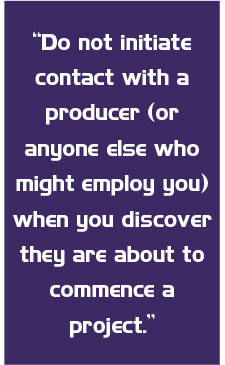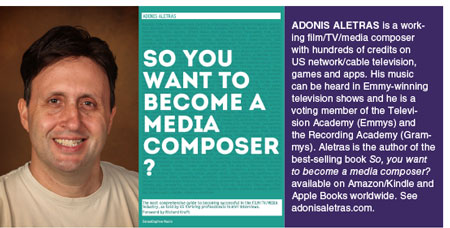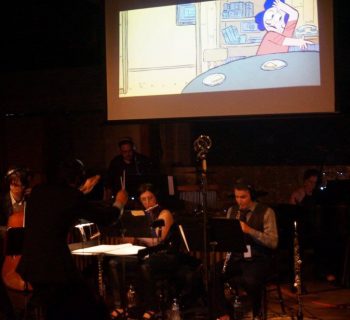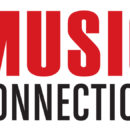Becoming a successful media composer takes more than sheer talent. It requires a number of non-musical skills, too, not to mention good timing and a bit of luck. To set you on the right path, composer Adonis Aletras, author of the recent book So, you want to become a media composer?, gives you an insider’s perspective on how to move forward and the mistakes you should avoid. He even includes comments from his busy colleagues who chime in with key insights from their personal experience. All agree that composers who eventually do get employed are not only great artists musically, but they ultimately master the art of getting hired.
You are a budding composer, with zero credits to your name and lots of enthusiasm to get out there and throw your proverbial hat in the ring. What is your game plan? What is your strategy? Do you have something in mind that will get you hired in the industry? If the only thing you have going for yourself is your college degree plus a demo posted on your website or on Soundcloud and assume that the demo will kick down some doors, you will probably have a very hard time during your initial steps.
Guess what—almost every beginner is doing the exact same thing as you are! So unless your demo is truly remarkable—something that will make people say: “I gotta tell my boss about this”—then your only achievement is to have joined the legion of others who have acted in the same manner without getting hired. Don’t get me wrong, I am not advocating against posting music. I am merely emphasizing that you should come up with a solid strategy toward getting hired, in addition to posting your music. On the other hand, you could have graduated many years ago and, despite your efforts, you are still on the fringes of the industry with a crushed soul. In that case, maybe you have to rethink your strategy because it’s rather obvious that it’s not working as it should. Very soon everyone comes to the conclusion that nobody in the industry cares very much about randomly posted demos or whether you have a degree in music. Knowing the alphabet does not make one a professional poet.
Every composer I interviewed in my book, So you want to become a media composer?, agree that no matter where you stand, you need to have two things firmly under your belt: great music and an even greater grasp of how the industry’s hiring process actually works. Writing that book has provided me with an intimate, insider’s view and, combined with my extensive personal experiences in the field, I can share their (and my) strategies that yield results. They may not get you hired overnight, so if you are in a hurry, stop reading right here! It’s a marathon, not a sprint.
Everyone assumes they can be a media composer, but not everyone wants to labor as hard as it’s required to make it happen. The market is inundated, so a lot of grumbling comes from the neophytes who begin to discover how challenging this really is or the veterans who have scorched their bridges. “The truth is you have to be willing to start small and find projects where the producers are more concerned with having music in their projects at all than who will be doing it. Or projects that friends recommend you for. Even then you might be competing with others who are starting out, but your chances are better than trying to jump in at the top.” (Neal Acree • World of Warcraft, Overwatch, Stargate)
As a rule of thumb, you need to manage your expectations and be patient. Those blockbuster movies or AAA titles will not come knocking on your door right away. Study the composers who are working on those titles and investigate their history in the business and their methodology. You will soon notice that the vast majority of them have worked long and hard to get to that AAA point by amassing enviable credits and experience. Enlarging your catalog of credits is the same as any other industry—being consistent with the quality of your work, fostering relationships and being a joy to work with.
It is quite naive to assume that talent alone will do the trick. Talent is never enough because you might be extremely talented but lack certain traits that are vital to kick-starting and sustaining a career. Success and talent do not always go hand in hand. Countless overly talented people are not successful and plenty of successful people are not overly talented! It’s not just about composing great music.
For instance, talent without leadership qualities will, in the long run, be wasted. Among other things, getting hired is about inspiring people around you with your strong vision and also about organizing effective teams. That’s what A-List composers do day in and day out. They are creative leaders. Being charismatic will make it easier for your clients to trust you with their projects. Will they hire a leader or a follower? Will they hire someone who does not exude confidence? Probably not. So do take a hard look at yourself and figure out what it takes to be a vivacious leader. Are you the person who will lead a team to victory? Do you possess inspiring charisma?
Here is some practical advice that covers most of the bases on how to approach the art of getting hired as a composer in the media industry:
1. Demoing Opens Doors
You can’t afford not to demo, especially when you are competing with established composers who will surely submit demos. If you don’t submit a demo you are effectively eliminating yourself from the race. You can’t compete in something you are not participating in! Think of demos as an investment. For some composers, demos are a way of life and what matters to them is how great their demos will sound, how competitive they will be. They will invest money in their demos hoping that their product will provide them with some much-needed edge over everyone else’s.
“I tend to represent awesomely talented composers who have a great deal of confidence in their abilities. Many of them welcome the opportunity to demonstrate what they can do, especially if their past work doesn’t necessarily show that in certain genres or mediums or level of project. It is always a gamble, but many composers take the risk if they think the reward of winning is worth it.” (Richard Kraft, agent • Kraft-Engel Management)
Producers and directors are generally not interested in hiring just a composer. They want to find the right composer who will ultimately enhance their project. So the fastest way to land the job is to demonstrate that your music is a perfect fit for it. Your demo is your fighting chance and if they give you a fighting chance, take it. Once you have an amazing demo, practice and strengthen how to present that demo online, in meetings and at professional events.
2. Do an Internship/Assistantship
An effective, indirect way of working in the industry is through an internship/assistantship. Many great careers of famous composers are the result of this. The worst way to go about it is to cold-call people en masse and promote yourself as an assistant. Do not, under any circumstances, do that. Research and focus on who you might want to join, find out if they have teams and then prepare a compelling proposal stating why you might be useful for them. The internet will be your best friend when it comes to digging up all the relevant information. Make sure you come up with a great looking resume/cover letter that leaves no doubt as to how useful you can be for their team or how you can best help them accomplish their goals.
Some internships are paid, some are not. Some provide unforgettable experiences and result in meaningful relationships, while some others end up as unmitigated disasters. For most people, relocating to a major hub like Los Angeles or London is the only way to become an intern. Therefore, one has to factor the long- and short-term costs of such a relocation before proceeding.
Responsibilities can range from walking the composer’s dog to programming and orchestrating. If you talk to current or former interns, they will most likely have different stories to tell and it’s actually a very good idea to have a chat with those folks before jumping onto that bandwagon. Irrespective of the outcome, internships are always an interim step and hardly anyone remains an intern or assistant forever.
3. Write For A Composer
Once you gain some experience, you might explore working (full- or part-time) for another composer, writing additional music or ghostwriting (composing for payment without screen credit or backend royalties).
You will need to contact someone who is incredibly busy and in no way can she/he handle everything by themselves. If, for instance, someone is working on multiple television shows, there’s a good chance they need to collaborate with others in order to get the job done in a timely manner. Sending them a good demo reel is very useful, but not nearly as useful and compelling as scoring scenes from that composer’s past or present projects.
It’s very time consuming to ask the composer to plow through your reel in order to assess how useful you can be to them. Furthermore, a great demo reel (musically) is not indicative of how well or fast you work under pressure. Most composers hire helping hands when they are under insurmountable pressure to deliver quality music on time. As with internships, payments/benefits/working hours/etc. may vary quite a lot.
4. Be a Team Player
Whether you are hired or you’re just an unpaid intern, you will very likely be part of a team. Therefore, it’s imperative to play well with others. Being on time and adhering to deadlines is paramount. “Death is not an excuse when you are under contract on deadline!” (Jeff Rona • Homicide: Life on the Street)
The right attitude and demeanor will go a long way because it’s more fun to work with someone who is easygoing and always ready to help improve things. Make yourself indispensable. Learn how to anticipate what your employers, or the other people above you, might need before they know they need it. Coders rewrite their code, actors do multiple takes, designers do multiple drafts. Editors create multiple versions. When it comes to revisions, composers should expect the same.
Really try to get inside the client’s head and achieve musically what they are hearing, version after revised version. Look for the simplest, most direct way to achieve emotional moments. Complicated music is easy to produce; simple yet effective music can be quite hard to generate.
5. Explore Library or Trailer Music
If you can write songs, then by all means also think about sync licensing. “The market for library music is constantly expanding, with millions of new online video makers willing to pay for music every year, and high-end clients usually care more about finding the right music than what it costs––meaning that prices aren’t being driven down at the top.
“The money can be very good if you write a lot of library music (e.g., over 500 tracks) for top-quality library labels and are patient enough to keep writing while you wait for the royalties to build up (it can take 5-7 years of heavy writing before income reaches these levels). You also have a lot of freedom and independence––if you do great tracks, you usually only have the library publisher to please, not a series of film or TV producers and directors. You are free to work from home. You can be flexible with your hours. Often the deadlines are relaxed, allowing you to go at your own pace.” (Dan Graham • Gothic Storm Library).
 Song sync has given indie artists the opportunity to earn money from their songs without the artists needing to tour or be signed to labels. Placement equals money, either upfront or backend or both. Fees depend on a number of factors but there is money to be made––if you play your cards right. Pretty much anything can be placed so long as lyrical requirements are met. Studying what is currently in sync is vital in order to get a feel for what is in demand at any given time. Watch TV shows and movies or go to websites such as tunefinder.com to get an accurate account of current placements on a weekly basis.
Song sync has given indie artists the opportunity to earn money from their songs without the artists needing to tour or be signed to labels. Placement equals money, either upfront or backend or both. Fees depend on a number of factors but there is money to be made––if you play your cards right. Pretty much anything can be placed so long as lyrical requirements are met. Studying what is currently in sync is vital in order to get a feel for what is in demand at any given time. Watch TV shows and movies or go to websites such as tunefinder.com to get an accurate account of current placements on a weekly basis.
6. Never Underestimate the Resources Available Online
Those resources can be beneficial, irrespective of where you might be located. For starters, Google your name and notice how many search results come back. You may be surprised to discover that your name gets mixed up with many other people who have the same name as yours. Therefore, your website and whatever else relates to you is buried under a mountain of others that have nothing to do with you. You may have to consider adopting a stage name or modifying your birth name in order to remedy the situation.
You simply cannot afford being mixed up with someone else. In a world where most social media outlets are co-owned and inter-connected, it is imperative to not only have a solid online presence, but to also have a unique online presence that points to you and your work. Not someone else’s.
Without delay, join several of the wonderful forums out there that specialize in media music. (A great Facebook forum is “Perspective, a forum for film TV and media composers.”) Make yourself known by actively participating in online discussions. The industry people can be found on Facebook and Linkedin while Instagram is best suited for self-promotion.
Having said that, establishing face-to-face relationships is enormously beneficial, so seek and discover online the pivotal industry events where everyone, from mere mortals to top level pros, attend and participate. These are the places where the all-important networking happens. It’s easier to approach industry VIPs at a conference than cold call their office or email them to book an appointment. Decorum and politeness are a must whether online or in person.
8. Be Aware of Your Brand
It is extremely important to be aware of your brand. “Be a brand and not a commodity. If you’re a commodity, you’re interchangeable with all the other commodities out there, and the only winner is the person who can offer the same services for the least amount of money. If you are a brand, you are unique, and can charge any amount of money for your services.” (Christopher Tin • Civilization IV, Tess)
Brand creation happens organically, sometimes without you being aware of it. Your brand is not static, it evolves over time. The key is to create compelling content and then use whatever social media outlets you are signed up with to magnify it because after all is said and done, quality content will always reign.
Talk with several directors, developers, producers and enquire about their day-to-day routines to get a notion of how incredibly challenging it is to produce any title/project. Composers are essentially an additional expense for the producer. Hence, the propensity to comprehend another person’s or a team’s vision, expectations of the job, temperament, working style and recurrent hurdles can help you become a sought-after collaborator.
Do not initiate contact with a producer (or anyone else who might employ you) when you discover they are about to commence a project. At that juncture, pretty much everyone is reaching out to them. However, if you support them during their rock bottoms––during the times when they assume they’ll never produce another TV show or movie again––as soon as they facilitate a project, they will contact you because they are certain you were mindful of them and their talent, regardless of their status.
The last thing you want to be is the person who calls on New Year’s Day to see if they can offer you a job. Be the person who asks how YOU can be useful to them all the time, not the other way around.
9. Prepare Well for Interviews
Find out the roles of every individual involved in the hiring process and investigate. Don’t forget that everything is a Google search away. If you don’t know who or what an “audio director” or a “music supervisor” is, you better make sure you find out well in advance! Research projects/people, look into the tech involved and have someone drill you with possible questions that an industry gatekeeper might ask. The market is saturated and volatile at the same time, therefore, you need to go in there and knock it out of the park in every way. Not just with your music.
Game developers hire based on the same spectrum of factors that filmmakers do: artistry, prestige, acquaintances, distinctiveness. They are, of course, looking for someone who is creatively on the same page, but personality matters a lot too. It’s important to be able to effectively convey your ideas in a way that gets people excited. They are, potentially, going to be working with you for several weeks or even an entire year. Therefore, they require someone who is passionate and has infinite quantities of zest.
10. Say Yes
Say yes to every scoring opportunity. No matter how big or small, flamboyant or trivial, paid or gratis—just grab on it and do it well. Work of any kind breeds more work. Ennio Morricone scored hundreds of unknown films before he won an Oscar! How else will you gain experience and those much-needed recommendations? People are more inclined to hire a working composer than an inexperienced wannabe. It’s really not that different from hiring someone to fix the plumbing at your house. Reputation and experience always come to our minds before we call anyone.
Think long and hard before you reject a student project. That student may just become the next hot director. Yes, there will be times when you may not get called again, despite your best efforts, but you have gained the experience and the credit. Both matter so much in the media industry.
By now, it must be crystal clear to you that you have to attend as many conferences as possible, introduce yourself, set up meetings, buy coffee/lunches, have your elevator pitch ready and solidify your online presence and get lots of experience. The composers who eventually do get employed are not only great artists musically, but they ultimately master the art of getting hired. Unlike other jobs, there are no classified ads for media scoring jobs because those who hire will rarely advertise for those opportunities. You have to be creative and hustle tenaciously until you get a break. Waiting for opportunities to fall on your lap is the most surefire way of not getting hired, even for the insanely talented. Creating opportunities despite all challenges and obstacles will get you closer to a career.
If you have a singular, unparalleled voice, then you have to make damn sure that it gets heard by the right people. If you’re waiting around for the industry to call you because you’re such a great composer, then you might want to consider checking your ego at the door. “What ultimately gets you hired is your acumen, your collaborative approach and your passion and history with media music. It certainly is tough for young composers just starting out to internalize this scenario, but it happens all the time.” (Neal Acree)
 Always Keep in Mind the Following
Always Keep in Mind the Following
• The industry is a business and you need to treat it as such. Understand the intricacies of getting hired. You have to spend money to make money––investing in self-promotion is just as important as investing in gear. Networking to promote yourself is a fine art, so learn it well and practice it wisely. Foster and nurture relationships while gaining valuable experience.
• Do not just post your demo online hoping that someone will find you. Locate that someone, preferably in-person. It’s much better to talk to one person who is listening to you than to shout at a thousand people who ultimately don’t care who you are.
• Win with your charisma and your great music!
For more on Adonis Aletras, visit his website.













